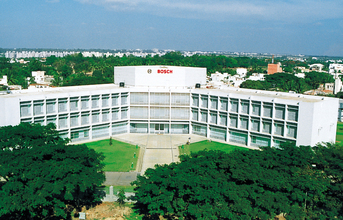
The Bosch Group is forecasting further strong growth for India over the next few years, and expects to see positive economic development in the country over the medium and long term.
Accordingly, the company sees India as a key pillar of its growth strategy in Asia Pacific. "Over the past ten years, Bosch has doubled its sales in Asia Pacific. By 2020, we are aiming to double our sales in the region again," said Dr. Volkmar Denner, the chairman of the Bosch board of management, during a press briefing in Bangalore, India.
Denner forecasts that after registering projected economic growth of around 4.8 percent this year, India will likely grow by 6 percent in 2015. This makes the country one of the global engines of growth alongside China. "We expect to see India establish itself as the world's fifth largest vehicle manufacturer by the end of this decade," Denner said.
In 2013, the company generated sales in India of approximately 1.2 billion euros, a three-fold increase over ten years ago. Bosch currently employs 27,000 associates at ten production sites and seven R&D locations in India.
Since 2010, the Bosch Group has invested around 680 million euros in the expansion of manufacturing and research facilities here, of which some 160 million were invested in the current year alone.
India is home to the technology and services company's largest development center outside Germany, employing 10,500 engineers. "We develop innovative solutions there which are used in products around the world," said Steffen Berns, president of the Bosch Group in India.
The rising number of patents filed testifies to the successful work at the center: from 20 registered innovations in 2008, this figure rose to 220 last year. "That's a more than ten-fold increase within five years," Berns said.
Dynamic growth in two-wheeler market
Bosch also sees excellent opportunities in the booming two-wheeler market: last year it registered a growth rate of 14 percent, making it one of the most dynamic markets in India. "We predict that the number of two-wheelers sold annually on the subcontinent will reach 27 million by 2020," Denner said.
Worldwide, the number of motorbikes and electric e-scooters sold is expected to increase from 100 million today to 150 million by the end of the decade. By comparison, Bosch forecasts that some 110 million new cars will be sold worldwide in 2020.
Against this backdrop, Bosch is also entering the global motorcycle market with new powertrain systems. Especially in Asia and India, efficient powertrains can play an important part in reducing environmental impact. For this reason, Bosch has developed an affordable and robust engine management system that is specially designed for the Indian and Asian markets.
Currently, many machines in Asia are still fitted with carburetors. It is precisely here that Bosch believes its technology offers a decisive advantage: "Compared with the mechanically controlled carburetor, and depending on situation, the electronically controlled fuel-injection system can reduce fuel consumption by up to 16 percent," Denner said.
This also significantly reduces emissions and conserves valuable resources. In addition, Bosch already supplies safety solutions for two-wheelers including ABS and the new MSC motorcycle stability control, which improves safety when braking and accelerating, even when the rider is leaning into a bend.
END



























